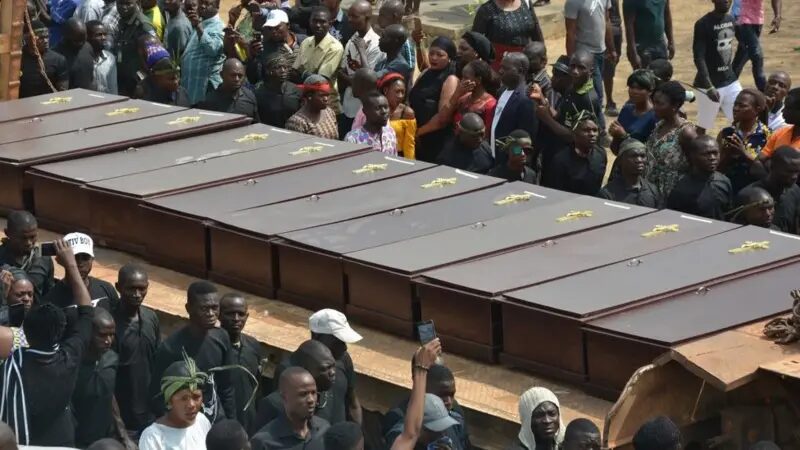Fulani Herdsmen Kill 86 Christians in Benue, Nigeria, Urging Military Emergency
Wave of Violence Grips Benue State

A brutal wave of violence swept through Nigeria’s Middle Belt, claiming the lives of 86 Christians in Benue State over two weeks. Consequently, armed Fulani herdsmen launched attacks, killing 46 people in a single day on June 1, 2025. Sebastine Hon, a prominent Nigerian attorney, urgently petitioned President Bola Tinubu to declare a military emergency. This escalating crisis, fueled by tensions over land and faith, now threatens the stability of one of Africa’s most volatile regions. Moreover, the violence highlights the urgent need for action to protect vulnerable communities.
The assaults struck with terrifying precision. For instance, on May 27, attackers targeted villages in Gwer West, killing over 40 Christians. Two days later, gunmen hit the Agan community in Makurdi during daylight hours. The deadliest attack occurred on June 1 in Apa County, specifically in Edikwu Ankpali and Opaha villages. Survivors recounted chaos as Fulani herdsmen struck after Sunday worship, shooting villagers and burning homes. Daniel Abomtse, a leader in Tse Antswam village, described the horror: “Gunmen shot some, slaughtered others, and set houses ablaze.” In Edikwu Ankpali, George Daniel confirmed a mass burial for 28 victims. Additionally, several villagers remain missing, likely abducted.
Local Leaders Demand Action
Victor Ormini, chairman of Gwer West Local Government Council, shared his grief with Christian Daily International-Morning Star News. “Last week, attackers killed over 40 Christians in our area, and now more have died,” he said. In Naka alone, locals recovered 14 bodies, but many others remain unaccounted for. Consequently, the violence displaced countless families. Survivors from Edikwu Ankpali fled to Odugbo village, another Christian community now fearing further attacks. Although police tactical teams arrived in Naka and Apa, they made no arrests by early June, leaving residents frustrated.
Sebastine Hon acted swiftly, writing to President Tinubu on June 2. He warned that Benue’s security situation was deteriorating rapidly. Hon urged the president to declare a military emergency, citing the failure of security forces to intervene during the attacks. “The situation demands immediate action,” he stressed. His plea reflects the growing desperation among residents who feel unprotected. Furthermore, the lack of arrests fuels distrust in the government’s ability to restore order.
Roots of the Conflict
The violence stems from a complex mix of environmental, ethnic, and religious tensions. Christian leaders in the Middle Belt argue that Fulani herdsmen, mostly Muslim, aim to seize Christian lands and impose Islamic dominance. Desertification has worsened the conflict, pushing herders into farming areas. Although many Fulani clans are not extremists, a militant subset employs tactics similar to Boko Haram. A 2020 report by the UK’s All-Party Parliamentary Group noted that these groups target Christians and their symbols deliberately. As a result, the Middle Belt remains a flashpoint for violence.
Benue, Nigeria’s “Food Basket,” produces yams, maize, and soybeans, making it a prime target. The state’s farmers clash with nomadic herders over scarce land and water. Since May 2023, violence has claimed over 10,217 lives nationwide, with Benue accounting for 6,896 deaths, according to Amnesty International Nigeria. Additionally, attackers have sacked 672 villages across Benue, Plateau, and Kaduna, displacing thousands. These figures underscore the crisis’s devastating toll on communities.
Responses and Controversies

Governor Hyacinth Alia, a Catholic priest, condemned the attacks as “heinous.” He vowed to crack down on criminals posing as herders. His administration has pushed for a 2017 law banning open grazing, though implementation lags. Meanwhile, Chief of Army Staff Lt. Gen. Olufemi Oluyede moved to Benue in early June, deploying more troops and pledging to lead operations himself. Social media posts on X captured public outrage, with one user describing a family burying 11 members after the June 1 attacks.
However, not everyone agrees on the solution. The Pathfinders Arewa Project, a northern advocacy group, warned against framing the crisis as purely religious. Chairman Abdulhamid Abdullahi Jakadan argued that land disputes and environmental issues drive the violence. “Zamfara and Katsina faced similar crises without emergency declarations,” he said, advocating for dialogue. This perspective highlights the challenge of addressing a multifaceted conflict in a diverse nation.
Global Concerns and Local Resilience
The international community has raised alarms. Nigeria ranks as the deadliest country for Christians, with 3,100 of 4,476 global Christian deaths in 2025, per the Open Doors World Watch List. The report labeled the violence “maximum” in intensity, driven by extremist Fulani militias. Father Humphrey Boyo of St. Patrick’s Taraku Parish called the attacks a “religious war” against Christianity. Survivors in his parish mourned the loss of homes and livelihoods.
Despite the devastation, Benue’s communities show resilience. Survivors in Odugbo village are rebuilding, though fear lingers. The military’s increased presence offers hope, but the crisis demands more than temporary measures. As Nigeria grapples with this violence, the call for a military emergency reflects the urgency of protecting lives. The conflict in Benue underscores the broader struggle for coexistence in a region where faith, land, and survival collide. Ultimately, lasting peace requires addressing the root causes—land disputes, environmental pressures, and weak governance—while ensuring justice for victims.

